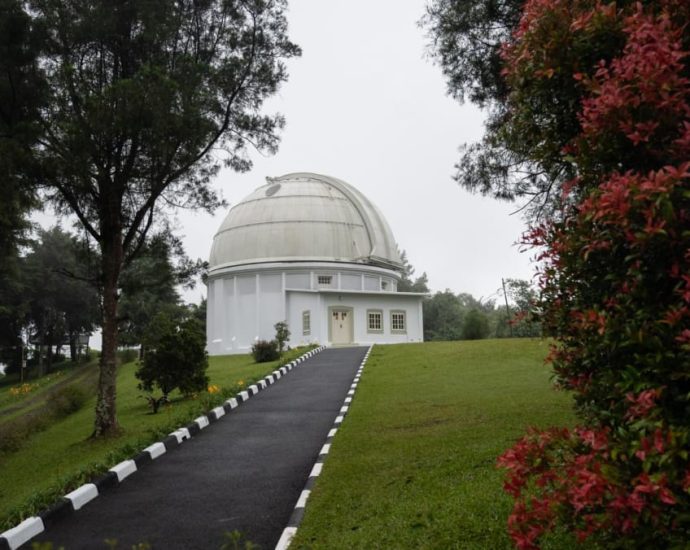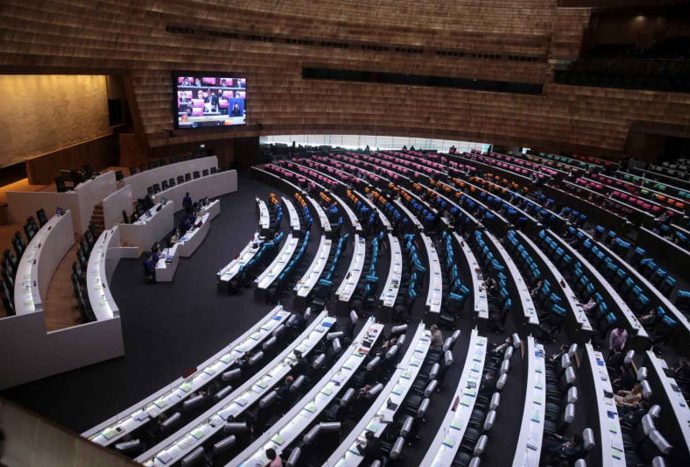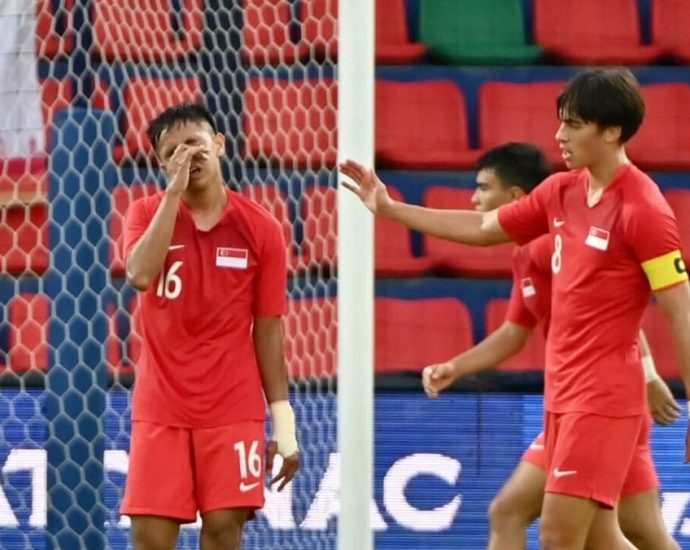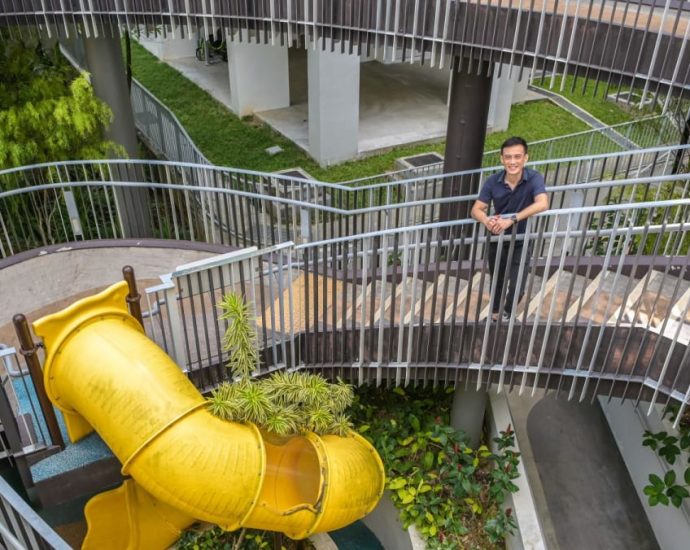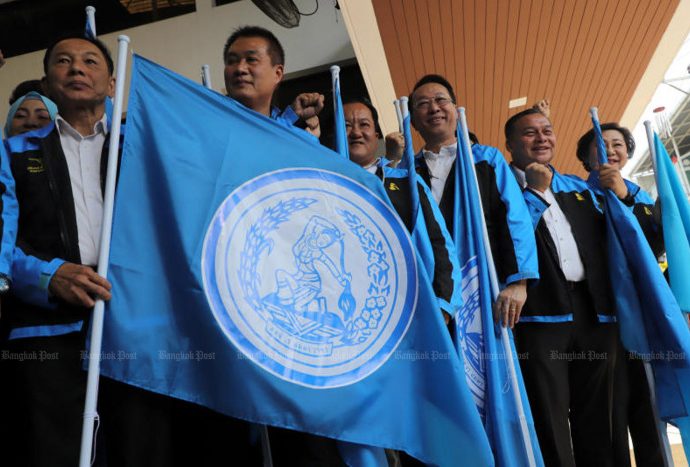Journo held for ‘exploiting police connection’

A journalist was arrested for allegedly using her connection with a senior police officer to demand 14 million baht from a Chinese suspect in exchange for having charges dropped.
The arrest was unveiled on Saturday by national deputy police chief Pol Gen Surachate Hakparn, who said the woman, identified as Guo Rui, or Gegee, exploited her working relationship with police to demand bribes.
He said he knew the journalist from work and that she was employed by the police as a coordinator due to her fluency in the Chinese language and overseas connections.
Pol Gen Surachate said police started an investigation after learning about her intentions and sought an arrest warrant after gathering evidence.
Guo, who was also chair of the Thai Jiaranai Group, a media company that owns Thailand Headlines, was arrested on Friday at her condominium.
Pol Gen Surachate said the suspect told Navaporn Phakiatsakul, a key suspect in a crime syndicate probe, that she could have charges against her dropped for an initial offer of 33 million baht.
Ms Navaporn instead paid Guo 14 million baht, he said.
Ms Navaporn was arrested in early April following a crackdown.
Inquiries showed she had a long history of fraudulent behaviour, human trafficking, surrogacy and document forgery.
Pol Gen Surachate vowed to take legal action against anyone using his name to demand bribes. Those found guilty of demanding bribes face a maximum fine of 100,000 baht or a jail sentence of up to five years.
A police source said Guo denied the charge and that she was temporarily released on a 3.5-million-baht bail.
The source said Guo worked as an interpreter for Pol Gen Surachate in a gun theft case in Nonthaburi.
Indonesiaâs oldest observatory losing its shine as tourism brings light pollution
Observation of the night sky, she said, can only begin after 11pm, granted that the sky is clear. Even then, scientists can only observe stars at an angle of more than 30 degrees above the horizon. If the telescopes are aimed any lower, the celestial objects would be completely awashContinue Reading
MFP, Pheu Thai to huddle over House Speaker post row

The Move Forward Party (MFP) and Pheu Thai Party will thrash out their differences over the House Speaker post, a position both parties have been aiming to fill, at a meeting with all eight prospective coalition partners on Tuesday.
The conflict over who should get the House Speaker position has raged on for days in interviews and on social media, prompting MFP leader and prime minister candidate Pita Limjaroenrat to come out on Friday to call on the coalition partners to remain united and settle the matter in talks.
Chaithawat Tulathon, MFP secretary-general in his capacity as party coordinator working on formation of an MFP-led coalition government, on Saturday said the discussion is expected to begin at 2.30pm at Prachachart Party headquarters. Mr Pita has stressed the importance of all coalition parties taking part, Mr Chaithawat said.
The meeting was initially intended to serve as a forum for the parties to discuss who will implement parts of a memorandum of understanding jointly signed on Monday, he said.
The MoU, signed by MFP and its coalition partners, sets out the policies they have agreed on so a government can be formed.
Discussions about the allocation of cabinet portfolios will follow Tuesday’s meeting, Mr Chaithawat said, adding some cabinet ministers in the MFP quota will also include outsiders who are deemed suitable.
The MFP has yet to formally begin internal discussions on who will hold which cabinet positions, he said. The allocation of cabinet portfolios could serve as more fertile ground for disputes, with Pheu Thai likely to ask for key jobs, based on their strong election night showing, just as they did the speaker’s job.
Prasert Chantararuangthong, Pheu Thai secretary-general, said both parties are expected to settle the House speakership matter this week. He said he was optimistic the talks would yield a fruitful result so that a vote to select a new House Speaker wouldn’t be necessary.
Mr Prasert said the dispute between the MFP and Pheu Thai over the speaker post was unlikely to lead to a serious rift or bar them from working together as a coalition.
Suchart Tancharoen, an elected list-MP of Pheu Thai and ex-deputy House Speaker, however, said some remarks by the MFP about the role of the House Speaker might have misguided people about the importance of this position.
In the past, a House Speaker wasn’t from a party that won a majority, but someone who was elected by fellow MPs, he said. More importantly, the speaker must always follow regulations and not be biased against bills proposed by other parties, he said.
Deputy MFP leader Nutthawut Buaprathum said he is confident the matter will be sorted out.
“Pheu Thai will never pull out and leave any opportunity for a dictator regime to return, for the sake of our [voters],” he said on Facebook.
Commentary: 70 years after the first ascent of Everest, the impact of mass mountaineering must be confronted

HAIKOU, Hainan: Mountains – their height, their mass, their climates and ecosystems – have fascinated humans for thousands of years. But there is one that holds extra special meaning for many – Mount Everest, or Chomolungma as the Nepalese Sherpa people call it.
A sacred mountain for some, for others the world’s highest peak represents a challenge and a lifelong dream. Seventy years ago, on May 29, 1953, that challenge and dream became reality for two members of a British expedition: New Zealander Edmund Hillary and Sherpa Tenzing Norgay became the first people to reach the 8,848.86m summit.
Their achievement was a testament to endurance and determination. It was also the crowning glory of the British expedition’s nationalistic motivations on the eve of the young Queen Elizabeth’s coronation.
From our vantage in the present, it also represents a high point, not just in climbing terms, but in what we now think of as the modern era of mountaineering. Since then, mountaineering has become massively popular and commercial – with serious implications for the cultures and environments that sustain it.
SCALING THE HEIGHTS
The early mountaineering era began in 1786 when Jaques Balmat and Michel Paccard reached the summit of Mont Blanc, the highest peak in the European Alps at 4,808m. From 1854 to 1899 (known as the classic mountaineering period), advances in climbing technology saw ascending peaks by challenging routes become possible and popular.
During the modern era from 1900 to 1963, mountaineers pushed further into the Andes Cordillera in South America, explored polar mountains and began high-altitude climbing in Central Asia.
Heart of the Matter: FAS to leave âno stone unturnedâ after Singapore football squad review

SINGAPORE: When the Young Lions came off the field after a 7-0 drubbing by Malaysia, the brickbats came fast and furious. For seasoned sports journalist Philip Goh, that result summed up the growing chasm of football standards between both countries.
“We’ve been losing at the age group competitions for quite a while now. Every single age group competition that we go to, we seem to come back with very adverse results.
“(The Malaysians) are continuing to progress, but we’ve been regressing,” said Mr Goh, on the latest episode of the Heart of the Matter podcast.
Mr Bernard Tan, acting president of the Football Association of Singapore (FAS), who was also a guest on the show, did not refute Mr Goh’s observation. He agreed that the younger age groups have not been doing well in tournaments and the key is to find out why.
On the SEA Games loss, he told host Steven Chia: “Never in our wildest dreams (did we think) we would lose 7-0 … some of them can’t really explain what went wrong on the field … the technical team (needs time) to really ask ourselves, what really went wrong?”
From sky terraces to sea views: What goes into designing HDB blocks
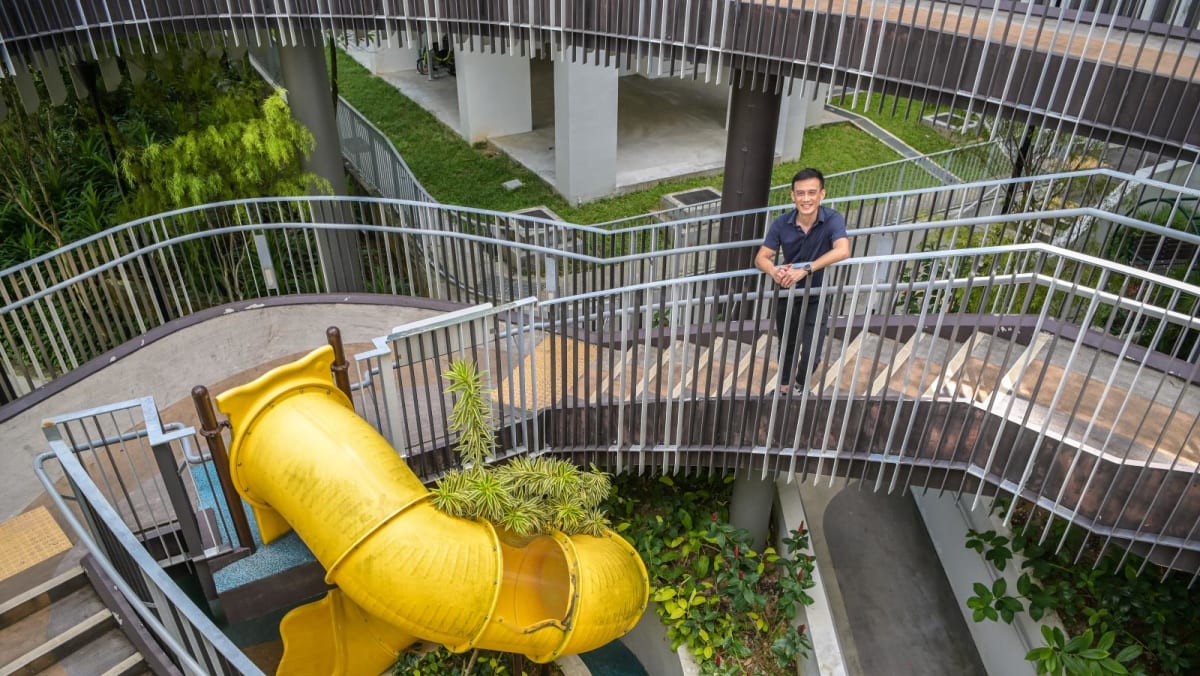
Precast technology is where the building components are manufactured off-site, and then delivered and assembled on-site. To maximise the use of casting moulds for greater cost-effectiveness, each mould is typically used at least 100 times for HDB BTO developments.
To allow more flexibility in design, HDB has developed a Smart Base Mould for precast facades, which comes with adjustable sides and attachments that can be added.
Based on this Smart Base Mould, the Eastlink team designed a mould with moveable parts, said Mr Leong. This helped the architects achieve a “sense of movement” in an otherwise “rigid” facade.
BUILDING REQUIREMENTS, DESIGNING GUIDELINES
For each project, HDB provides architecture teams with specifications such as the number of homes to be built and the type and quantity of flat types. Facilities required are also listed; this can include playgrounds, fitness corners, pavilions and commercial spaces.
The design brief also covers the building form and layout, pedestrian and vehicular connectivity, layouts for various flat types and regulatory and technical requirements.
These requirements help architects shorten their design time as they do not have to create their own layouts from scratch, said HDB.
“The consistency of flat layouts also allows for standardisation of structural, architectural as well as mechanical and electrical components, which in turn helps to enhance the efficiency and speed of construction.”
Regulations are also in place to ensure homes are more sustainable than before. For example, all new public housing projects since 2014 have to provide centralised chutes for recyclable waste, regenerative lifts and energy-saving light fittings in common areas.
Other guidelines the architects have to take into account include keeping the design consistent with HDB’s vision for the town. The theme and identity of the town percolate through the housing projects, influencing the colour palette, designs of playgrounds, fitness corners and signs.
Commentary: We shouldnât need to designate MRT priority seats

SINGAPORE: With her Minion-like physique, snazzy purple outfit, round cherry-red spectacles, jaunty flower in her hair and a smile on her face, most of us would have met Stacey – or as she’s more commonly known, Stand-Up Stacey.
The Land Transport Authority (LTA) cartoon mascot is a common sight in MRT carriages, on huge stickers right behind the priority seats that read: “Show you care. Offer this seat”. Yet, poor Stand-Up Stacey and commuters recently had the misfortune to witness two men verbally abuse each other, ostensibly over priority seats.
A video circulating on social media showed an older man berating a younger man seated in the priority seat, using phrases such as “you not Singaporean” and “stupid guy”. The younger man responded with a volley of insults, pointing out that giving up his seat is “not in the Constitution. It’s not the law”.
Have priority seats, intended to nudge the best in us, somehow brought out the worst in us?
Netizens had plenty to say about this incident – on both sides. Some advocated showing graciousness by offering seats to older people without waiting to be asked, especially as priority seats are designated near the doors for convenience. Others pointed out that young commuters also paid their fare and could be tired from working the whole day.
A few took issue with the needlessly aggressive tone of both parties. One even made ableist comments about not taking public transport if one cannot stand, completely missing the point that a well-designed public transport system is supposed to be affordable, accessible and inclusive.
CNA Explains: Chinaâs soft panda power in a time of hardening geopolitical tensions
But is this changing along with perceptions of China on the global stage, as well as what could be characterised as roiling ties with several countries in the West and beyond? “In the past, it seemed that China was wanting to seek or strengthen favourable relations with other nations,” saidContinue Reading
Cannabis-flavoured gummies, âCBDâ massages in Thailand: Why Singaporean visitors must beware
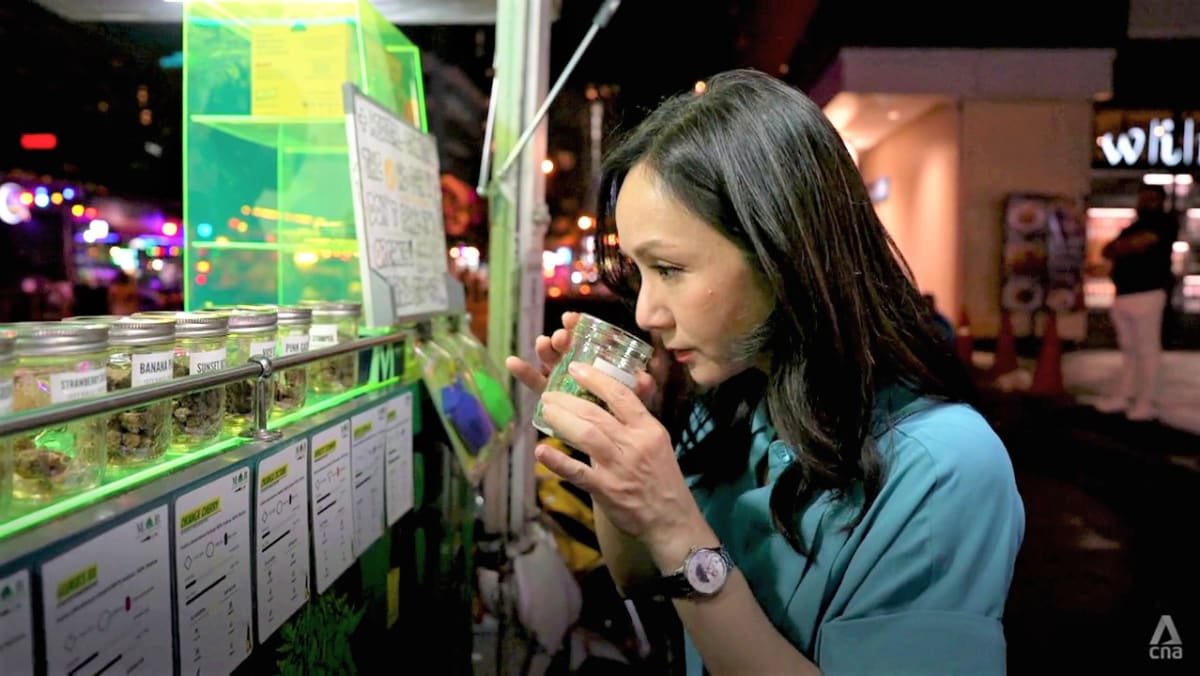
“No one, absolutely no one, is batting an eyelid,” programme host Diana Ser remarked as she walked down a street in Sukhumvit district filled with mobile trucks selling cannabis and related products.
And from the English-language signs and menus in some shops as well as the English-speaking staff, one surmises that “tourists are definitely one of the target audiences”, said Saksith.
Four Twenty Dispensary, for instance, gets Singaporean customers “quite frequently”, said its senior operations manager, Mark Nakayama. “They ask for (cannabis) flowers, but then they also come for edibles and some sort of accessories.”
Kiew Kai Ka restaurant, which uses fresh and dried cannabis leaves in its food, also sees Singaporean patrons, said manager Mike Nuttapong. “They’re curious about how it tastes and maybe the side effects … when they consume our dishes.”
Dems deny coalition rumours

No talks on setting up rival bloc
The Democrat Party on Saturday denied rumours that it was in talks with another party to form a rival coalition that excludes the Move Forward Party (MFP) and the United Thai Nation Party (UTN).
Ramet Rattanachaweng, acting Democrat spokesman, said no Democrats have taken part in any plan to set up a rival coalition and such rumours tarnished the party’s reputation.
Meanwhile, Mr Ramet said the party would not get involved in a dispute over the role of the House Speaker following tensions between the MFP and the Pheu Thai Party over who should get the post. It is the prospective coalition’s business to thrash out the issue, he said.
He said the House Speaker, who is the Parliament President by default, is required by the charter and parliament regulations to be impartial when carrying out his duty.
He said Democrat patriarch Chuan Leekpai did a perfect job and maintained impartiality when he was called to exercise judgements in parliament. He said he believed the prospective coalition partners could find a qualified person for the post.
He rejected reports that the Democrats and Pheu Thai would make a deal on who should be House Speaker.
Mr Ramet defended Mr Chuan over the latter’s decision not to include a bill seeking to amend Section 112 on the House agenda during the last parliament, saying the proposed law was unconstitutional.
“It’s not right to say he didn’t support a public-sponsored bill. Several proposals initiated by the people were examined and passed into laws. A proposed constitutional amendment proposed by the people was also accepted for consideration,” he said.
The spokesman also said the party, which won 25 seats in the general election, would not support any MFP-led bid to revise Section 112 although the matter is not part of the agreement reached by the eight prospective partners. He said Democrats have gathered information about the amendment proposal sponsored by the MFP and are gravely concerned on several points.
Earlier, former massage parlour tycoon Chuvit Kamolvisit said two parties were working out a plan in case the MFP’s bid to set up the coalition government failed.
He also said the current government bloc led by Prime Minister Prayut Chan-o-cha and Deputy Prime Minister Prawit Wongsuwon were not giving up their plan to stay in power.


